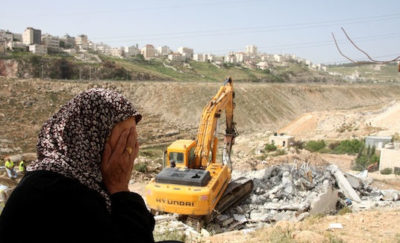According to a new report issued Friday by the United Nations Office for the Coordination of Humanitarian Affairs, up to 150 Palestinians have been rendered homeless by Israeli home demolitions in the past two weeks alone.
The report only counts the demolitions carried out in Jerusalem and the West Bank, and does not count the 130 homes destroyed and 700 damaged in the Gaza Strip during the massive Israeli bombardment of the past weekend. An estimated 6 Israeli homes were slightly damaged by the Palestinian shells fired in response to the Israeli bombardment.
In the biweekly Protection of Civilians Report issued by UN-OCHA, in the past two weeks, Israeli forces destroyed 41 Palestinian-owned structures in occupied East Jerusalem and Area C of the West Bank, directly displacing 38 homeowners and affecting 121 others.
Most of the demolitions took place on the pretext of construction without a permit. Palestinians have been unable to receive permits for construction of any structures on the land they own since the Israeli military occupation of the West Bank and Jerusalem began in 1967.
Of these demolitions, 37 were in East Jerusalem and four in Area C of the West Bank (the area that has been under full Israeli control since the Oslo Accords in 1994 – despite the requirement that these lands be returned to Palestinian rule by 1998).
On April 29 alone, the Israeli authorities demolished 31 structures in multiple neighborhoods in East Jerusalem, marking the highest number of structures demolished in a single day in East Jerusalem since OCHA began systematically monitoring demolitions in 2009.
On April 25, the Israeli authorities demolished a home in Az-Zawiya village in the West Bank on punitive grounds, displacing a family of seven, including five children, the report continued.
The home belonged to the family of a 19-year-old Palestinian who was accused of killing an Israeli soldier and an Israeli settler, and injuring another soldier, near Ariel Israeli settlement on March 17, 2019. The Palestinian was subsequently killed by Israeli forces in a separate incident.
This was the fifth punitive demolition since the beginning of 2019 compared to six in 2018 and nine in 2017.
During the full month of April 2019, at least 70 structures were demolished in the occupied Palestinian Territories (including East Jerusalem) by Israeli forces, displacing at least 70 people- including 33 children- and affecting a further 313 people, according to OCHA.
All the demolitions and confiscations, other than the two punitive demolitions, were carried out on grounds of lacking an Israeli-issued building permit. Most of the demolished structures supported agricultural, herding and commercial livelihoods.
As the Israeli Committee Against House Demolitions points out, as is the case in situations of armed conflict including situations of military occupation, International Humanitarian Law applies to the occupied Palestinian territories. The Hague Regulations of 1907 and the Fourth Geneva Convention of 1949 enshrine many of those provisions most pertinent to the protection of the Palestinian population.
As per article 43 of the Hague regulations, Israel as the occupying power is obliged to provide for the well-being of the protected Palestinian population and to ensure“public order and safety, while respecting, unless absolutely necessary the laws in force in the country”. Israel must therefore refrain from altering local laws in place or extending its own legislation over the occupied territory – including extending these discriminatory planning laws.
IHL stipulates that private property must be respected. Specifically, it is forbidden for an Occupying Power to destroy property except where such destruction is rendered “absolutely necessary by military operations.”
Article 49(1) prohibits individual or mass forcible transfers. Such forcible transfers are occasioned through the establishment of a coercive environment, which encompasses practices such as home demolitions and threats of demolitions, relocations, settler violence and harassment and restrictions on movement and access, which force inhabitants to relocate to other areas.
The demolition orders infringe upon norms of international human rights law, which Israel is obliged to respect and uphold. Such rights include the right to: adequate standard of living, adequate housing, freedom from cruel, inhuman and degrading treatment, non-interference with privacy, home and family, and equality and non-discrimination.
In its General Comments, the Committee on Economic, Social and Cultural Rights identified legal security of tenure as one of the core factors in ensuring adequate housing and stated that “all persons should possess a degree of security of tenure which guarantees legal protection against forced eviction, harassment and other threats”.
Under international law, the State has the duty both to refrain from forced evictions and to ensure that the law is enforced against third parties who carry out forced evictions.
Instead, Israeli occupying forces regularly carry out both punitive and ‘administrative’ home demolitions, with the stated objective of displacing Palestinians from their land in order to expand the territory of the state of Israel by force.

